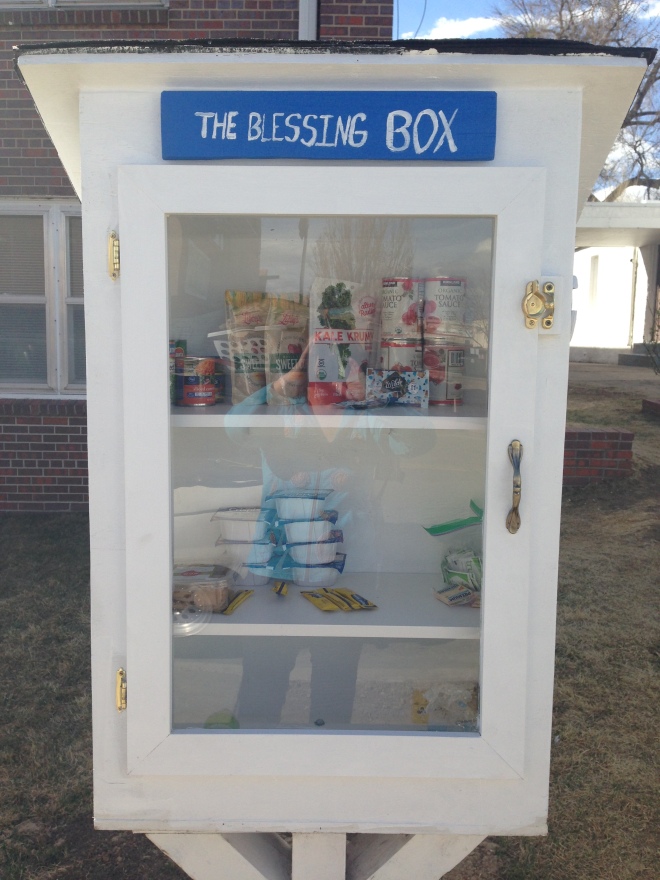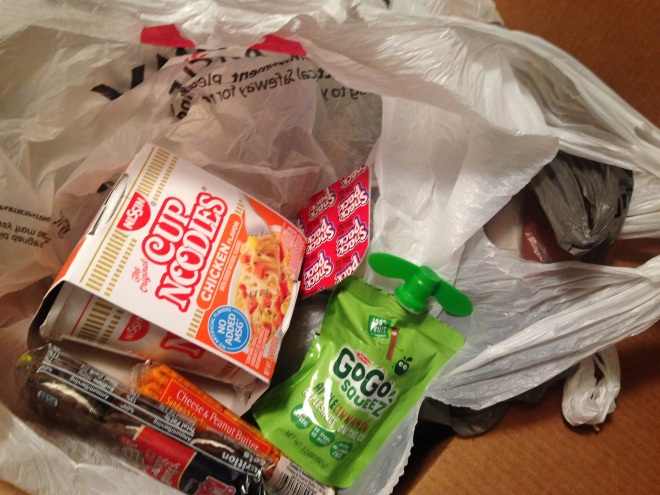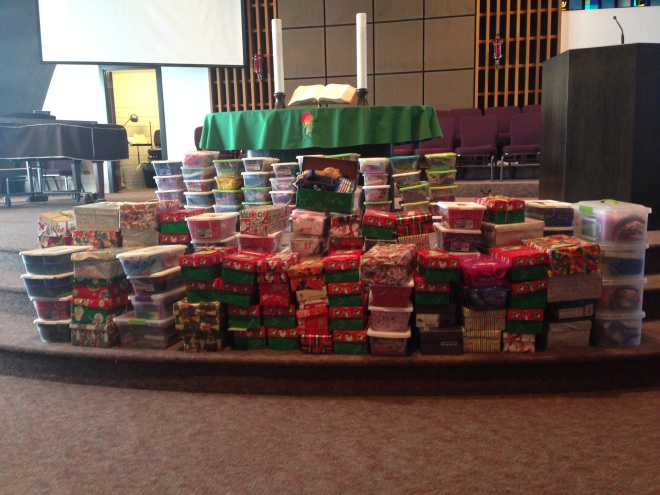
Arvada Christian Church recently filled up my truck with goodies for Arvada The Rising Church’s ministry for the disadvantaged and homeless.
Extreme networking!
Thank you to both churches!

Arvada Christian Church recently filled up my truck with goodies for Arvada The Rising Church’s ministry for the disadvantaged and homeless.
Extreme networking!
Thank you to both churches!

Here in Arvada, Colorado our woman of the year, Rebel Rodriguez runs an amazing food bank serving disadvantaged residents and Arvada’s homeless. She also stocks an equally amazing little free food bank on the corner of Grandview and Olde Wadsworth at the Rising Church. The Blessing Box.

Inspiring me to make snack and lunch bags for our children and homeless.
 Thank you Rebel for your community service, to read more about Rebel go here to Rebel’s article.
Thank you Rebel for your community service, to read more about Rebel go here to Rebel’s article.

Drawn with stick pen from pew.

Each year our little community at Simpson United Methodist Church fills shoe boxes with surprises for children in need of a smile.
Operation Christmas Child is a project of the international relief organization Samaritan’s Purse. Donations of shoe boxes filled with small toys, hygiene items, and school supplies for children who do not receive gifts, children affected by war, poverty, natural disaster, famine and disease; and to children living on Native American reservations in the U.S.
The program started in the United Kingdom in 1990 by Dave and Jill Cooke has expanded and since then has delivered gift-filled shoe boxes to over 135 million children in more than 150 countries and territories.
Some fun things I found this year? A fluffy puppy purse with for some lucky girl (I wanted to keep it for myself and secretly named it Henry), and fold up back packs with about 30 different smiley face emoji decorations, purple for girls and blue for boys.
 Found: one package of premium origami paper.
Found: one package of premium origami paper.
Cost: $0.99
 Use: donated to church.
Use: donated to church.
The church has two uses.
The candle lighting area for concerns or celebrations. The small dish of folded origami crosses, take one after you light your candle as a remembrance.
The monthly card ministry. Each month’s recipients receive an origami surprise.
“Lessons from Hannah, Our Mother of Faith”
(1 Samuel 1:4-20; 1 Samuel 2:1-10)
Messages Received:
“Lessons from Hannah, Our Mother of Faith”
(1 Samuel 1:4-20; 1 Samuel 2:1-10)
Today’s lection is the last of three weeks that focuses on women at the margin of society. Like Ruth last Sunday, Hannah is a woman who was marginalized and discriminated for reason beyond her control. She was barren or childless, and it was a shame for a woman not to bear a child. In the Bible, God is said to be one who opened and closed the womb, and there is no biblical story about an infertile man. So like many cultures, barrenness is considered a woman’s problem, not a man’s. Barrenness or infertility is thus construed as a divine hand or curse. Now, having a son would validate Hannah and restore her status in society.
In many male-dominated cultures, having no children, especially male children, was a sign of failure in life. It is seen as lack of a future because the “bloodline” is continued through the male child. Walter Brueggemann in The Prophetic Imagination says that barrenness is a metaphorical reference to “a loss of a future and therefore to hopelessness.” He says that “the notion of barrenness may be taken as a condition of despair in our society.” Indeed, it could be taken as a condition of our churches today. Many churches lament that they don’t have young people, youth and children. These are our future who have vanished and have very little or no interest in church. Where then is the future of the church? Hannah’s barrenness, wilderness, emptiness or insecurity of the future is perhaps a reflection of the state of the church today.
Also think of so many people who experience a deep sense of the lack of a future ahead of them. They see no way forward. Think of the veterans who suffer mental problem with no hope for future. Think of undocumented aliens who face deportation and separation from their loved ones any moment. They may be working hard, but their future is grim and uncertain. But the good news is that God “opened” Hannah’s womb and she gave birth to a son who became one of the greatest prophets. The church is called to be hope for the hopeless, to hold out hope and make a way for those who see no way.
—
Tezenlo Thong, Pastor
Simpson United Methodist Church
(Mark 6:16-29; Amos 7:7-15)
There are two ways in which you and I can be troublemakers. One way is by simply causing trouble – creating fear, spreading racism and bigotry, engaging in mass shooting, committing fraud or amassing wealth through ill-gotten gains. Creating trouble for oneself, one’s family and society by engaging in evil.
There is another way in which we are considered troublemakers in a different sense. If you lead an honest and truthful life, refusing to let wicked people go unopposed, unsettling their conscience, you are a troublemaker, because you bring trouble to their consciences. You are a troublemaker because you give no peace to a wicked person. You speak the truth, you stand up for justice and equality, no matter what, and people do not like it.
God’s troublemakers are those who speak truth to power and bring trouble on troublemakers. “Blessed are peacemakers,” so said Jesus. You can’t be a peacemaker without being a troublemaker. You have heard the saying, “Well-behaved women seldom make history.” We are taught to be nice and not cause trouble, especially in church. The truth is, nice people seldom make history or bring about change.
As Christians, we stand on the prophetic tradition, a tradition with all kinds of trouble making radicals who made wicked kings, rulers and rich folks uncomfortable. The role of the Old Testament prophet was not foretelling, but forth telling, speaking truth as it is. That’s exactly what Amos did in the capital city of King Jeroboam. On hearing Amos, the chief priest declared, “The land cannot bear all his words.” Indeed, truth is hard to bear. One cannot not be troubled by a prophetic voice.
John the Baptist is considered one of the last prophets. He could not remain silent. He had to speak up against what he saw in his time as evil and immoral. He was a thorn in the flesh and heart of King Herod and Herodias, his brother Philip’s wife whom he married. John stirred things up that others were afraid to do. And it cost him his life.
When there is any kind of discrimination and injustice, the church should be out there stirring things up, crying and demanding for justice and equality for all. The prophetic voice of the church is the voice of God in unjust society. It is the voice of God in unrighteous generation. It is much easier to smile and be nice than to confront someone for wrongdoing. Being a troublemaker is not easy or comfortable, but it’s a part of the Christian calling and discipleship. May God help us to be faithful and bold troublemakers when circumstance demands our unwavering witness.
Tezenlo Thong, Pastor
Simpson United Methodist Church